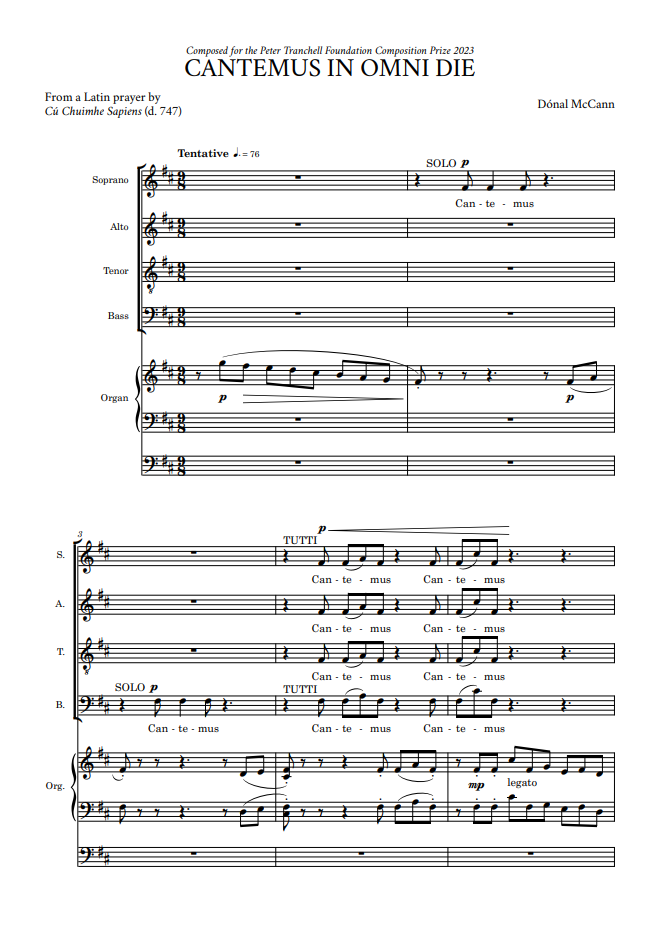The winner of the Peter Tranchell Foundation Composition Prize 2023: Cantemus in omni die, by Dónal McCann
- Posted in:
- music
- competition
The Peter Tranchell Foundation is pleased to announce the winner of the 2023 Peter Tranchell Foundation Composition Prize: Cantemus in omni die, by Dónal McCann. The work will be published here soon, along with news about performances. The free score is available below.
Also Highly Commended in 2nd place was Lift up your heads, by Liam Condon.
David Hill, our judging panel Chair, said:
It was a huge pleasure to be on the panel to find a winner for this excellent competition. The standard was very high and we all appreciated the efforts to which so many went in composing a carol befitting of the legacy of Peter Tranchell.
May the Foundation go from strength to strength and congratulations to Dónal McCann for his excellent carol.
Cheryl Frances-Hoad, one of our panel judges, added:
Congratulations to Dónal McCann, whose carol manages to take something of both the spirit, and compositional technique of Peter Tranchell, and add something new too: I hope Cantemus receives many performances in the future.
Dónal provided an account of his use of the competition brief:
In writing a companion to Peter Tranchell’s People, look East, I sought to respond to two aspects of the work: the musical content and the general character.
The harmonic language of my piece is derived from the head notes of Tranchell’s choral part (G#–D#–E–A), which I have used in inversion (G#–C#–B#–Fx). This cell informed the mode of the piece, which is vaguely octatonic. The pitch relationship between these four notes is also used throughout the piece (e.g. b. 25, 33–34, 69–70) and becomes more important as the piece progresses. There are also some smaller quotations, such as bar 10 which corresponds to bar 27 in People, look East.
That’s all quite dry, and I was more interested in responding to the witty character of Tranchell’s piece. I aimed to capture this by providing my own unison tune as a reflection of Tranchell’s, whilst keeping it sufficiently different by focusing on triple time, a Latin text and an unconventional structure.
The text I chose was written in the 8th century by an Irish monk, Cú Chuimhe 'Sapiens'; it is the first example of a hymn written to Mary in Latin (rather than translated) in the Western Church. It highlights the collision between human and divine in the conception of Jesus, encouraging us to sing a joyful hymn of praise to Mary. As with Eleanor Farjeon’s text, this is strophic, however my piece is structured as a combination of being both strophic and through-composed, with a continuous accelerando and heightening of stakes as the piece progresses, culminating in an exciting statement of the tune without the previous embellishments.
All this considered, I hope the general effect of the piece is to bring a smile to the face of the listeners, whilst also allowing for prayerful meditation on Mary’s role in the season of Advent.
About Dónal McCann
Born in Belfast, Dónal McCann is the Assistant Organist at New College, Oxford. His musical education began as a chorister at St Peter’s Cathedral, Belfast, before taking up organ lessons with Professor Gerard Gillen at St Mary’s Pro Cathedral, Dublin. At New College, Dónal is involved in all aspects of musical life, principally teaching music and accompanying the renowned chapel choir.
Before moving to New College in 2020, Dónal was organ scholar at King’s College, Cambridge, where he read music, graduating with a double first. At King’s, he accompanied the world-famous chapel choir under the direction of Sir Stephen Cleobury and subsequently Daniel Hyde, playing for daily chapel services, as well as in recordings, tours and broadcasts, including the annual Festival of Nine Lessons and Carols.
In addition to his work at New College, Dónal is co-principal keyboardist of the Oxford Bach Soloists. He has given many recitals in the UK and abroad, and has recently collaborated with the Instruments of Time & Truth, and appeared as a guest soloist with the Ulster Orchestra and Academy of Ancient Music. His playing was described as ‘authoritative as well as attractive’ by Gramophone magazine, and his debut solo album, ‘Bach & Walther: Concerto Transcriptions’, as ‘a wonderful showcase for his talents’.
Dónal has studied composition with Jonathan Woolgar, Richard Causton and Jeremy Thurlow. His compositions can be heard regularly at New College, and have featured in programmes across churches and Cathedrals in the UK and Ireland.
The score
To encourage widespread performance of the work, we are making the score freely available - Cantemus in omni die, by Dónal McCann (or click on the image below).
